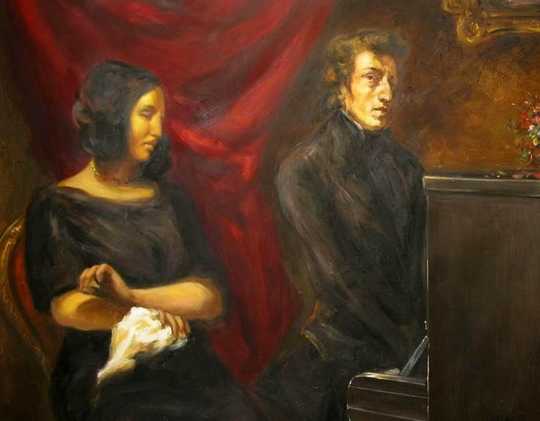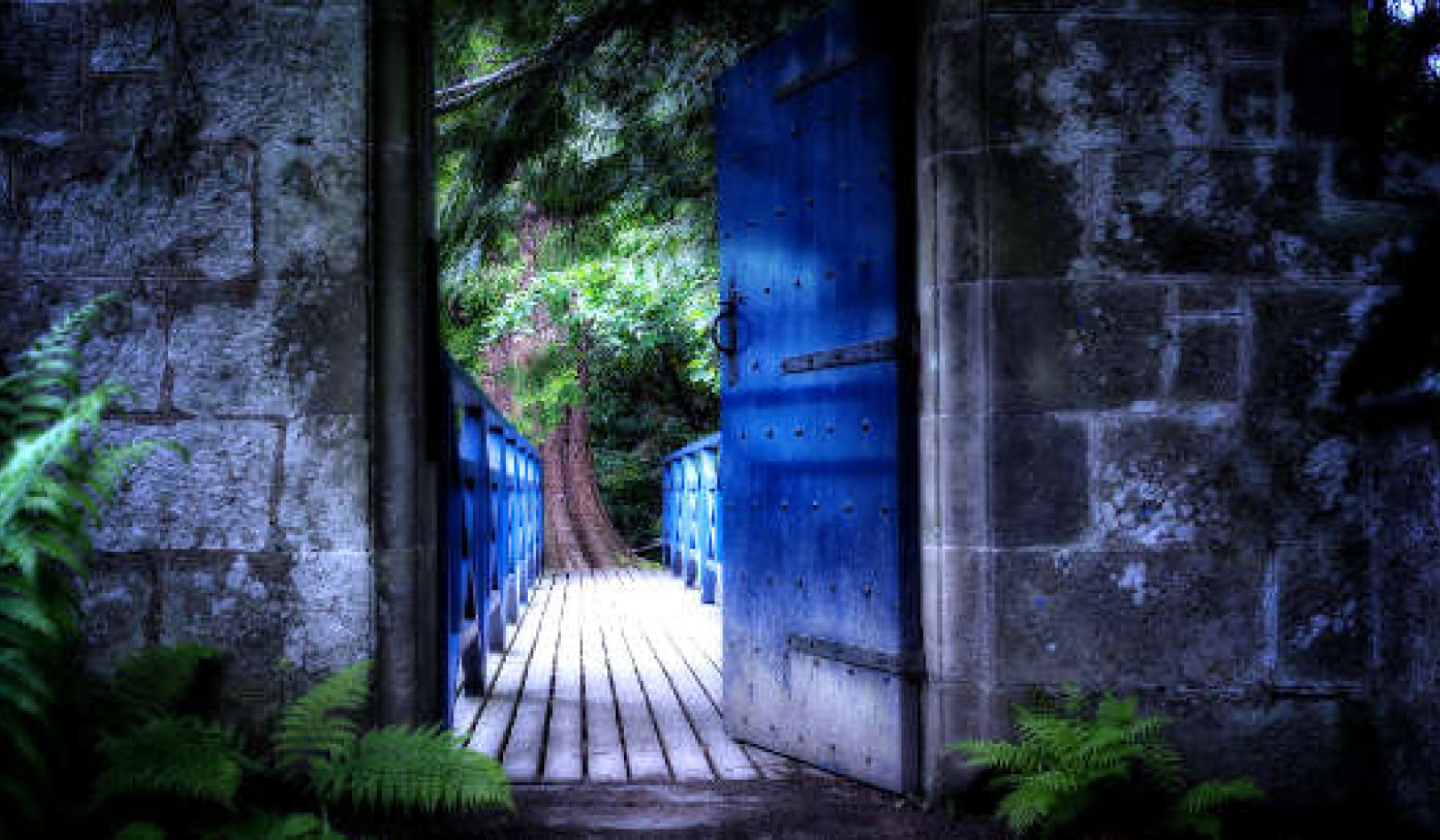
ChopinSandDelacroix. Eugène Delacroix
More than four million Britons watched Amber Gill and Greg O'Shea being crowned the victors of Love Island 2019. Gill, a beauty therapist and model from Newcastle in the north of England, and O'Shea, a rugby player from Limerick in Ireland, proved the most popular pairing among the 24 reality TV show contestants on the Balearic island of Mallorca.
Their 12-day romance has ensured fame, fortune and social media influence for the two 20-somethings – and it won’t hurt Mallorca’s tourism numbers either. But perhaps few of the contestants or viewers know that tourism on Mallorca was kick-started almost two centuries ago by an earlier pair of star-crossed celebrity lovers, in a remote lodging just a few miles away from the ITV villa. So while Love Island might feel quintessentially 21st century, it was prefigured by events on the same island in 1838.
In that year, the “most famous woman in France”, the avant-garde, aristocratic, cross-dressing, best-selling novelist Aurore Amantine Dupin Dudevant – known by her male pen name of George Sand – travelled to Mallorca with the lauded Polish composer, pianist and political refugee Fryderyk Chopin. She was 34, he six years her junior.
Sand claimed they had sailed to the Balearics seeking solitude, where she could write and Chopin compose. They were likely also fleeing from the scandal their love affair had caused in Paris. Sand was a high-society rebel, a divorced mother of two who had successfully won custody of her children. The critic Robert Graves has described her as “the uncrowned queen of the Romantics”, a conscious pioneer of a “modern”, liberated lifestyle.
At 28, Chopin was the same age as several of the Love Island hopefuls. Like one of this year’s contestants, he came to Mallorca with a recent broken engagement behind him – to fellow Polish émigré Maria Wodzi?ska. Yet unlike the bronzed, toned bodies of the 2019 ITV islanders, Chopin was in 1838 already ailing, with bronchitis or tuberculosis. Writing to a friend from the island, he described his own appearance. He dressed informally, Chopin explained, but his skin was still wan: “Behold me [here] without white gloves, without curled hair, but as pale as usual.”
Mallorca in the 1830s was heavily agricultural. In her travel memoir A Winter in Mallorca, Sand estimated that almonds and pigs were the main exports, and she described too the orange groves, figs and olive trees. To the two Parisians the island seemed fertile yet strangely impoverished. “No peasant in the world is so dreary or poor,” Sand concluded. The island’s infrastructure for foreign visitors was extremely limited in the early 19th century.
Sand and Chopin sailed from Barcelona on a cargo ship, its hold full of hogs. Arriving in the capital of Palma, to their shock the couple could not find a functioning hotel. They stayed in expensive rented rooms in a bad neighbourhood – and Chopin’s piano was impounded by customs officers. They ended up renting a cell in an abandoned Carthusian monastery in the mountain village of Valldemossa.
The lovers’ Mallorcan tryst was bittersweet. Chopin’s letters praised the natural beauty, calm and “poetic feeling” of the island. He took pleasure in the “African sun”, the blue sea and the eagles he watched gliding overhead. Sand, however, grew disillusioned. She was angry in particular at the locals who disapproved of the unmarried lovers, and later vented her feelings in her notoriously acerbic memoir.
Yet however unflattering her account, Sand’s book put Mallorca on the literary map. She joked that she had “discovered” the island and predicted that once international travel connections improved “Mallorca would soon prove a formidable rival to the Alps”, a new destination for the North European traveller. That prophecy was realised with the opening of an international airport at Palma in 1960, and the advent of mass tourism.
Then – as with Love Island now – the couple’s Mallorcan love spectacle inspired much hand-wringing, moralising and outright disdain in the newspapers of the day. A journalist writing in the Polish monthly Przegl?d Pozna?ski, for example, lamented Chopin’s extra-marital love affair:
Our respect for this person should not blind us, or cause us to pass over in silence things which are so severely condemned by society. It is a source of bitter sorrow that such a beautiful life has not been without deep stain.
Today, contestants hope that a successful stint on Love Island will generate income from advertising, guest appearances and endorsements. For Sand and Chopin, the Mallorcan interlude was also productive for their own careers. Sand wrote her novel Spiridion in the monastery, and Chopin composed a number of pieces at Valldemossa. But the romantic happy-ever-after which the most gossiped-about couple of 19th-century Europe had sought in the Balearic sun proved, ultimately, far more elusive.
Unhappy ever after
Like many Love Island contestants, Chopin and Sand found that an extended stay in a Mallorcan hideaway was no guarantee of successful long-term romance. The trip had an ambiguous effect on their relationship. Chopin was already seriously unwell, and his love affair with Sand would break down in terrible, very public recriminations a few years later.

A fine romance? Love Island winners Amber Gill and Greg O'Shea. ITV Studios
The Polish pianist died in Paris in 1849 and Sand did not attend his funeral. Graves has speculated that the hostile reception which the lovers received from socially conservative, Catholic Mallorcans heightened the existing tensions in their relationship, fuelling Chopin’s own internal misgivings.
We do not yet know if the Love Island villa – rented by ITV from its millionaire German owner – will become a tourist attraction. But at Valldemossa, the Chopin-Sand connection is still a major visitor draw, 180 years on. The town boasts a museum, and offers visits to the monastic cell where the couple lived, as well as regular recitals of Chopin’s music.
Relics associated with the famous visitors are displayed – including Chopin’s piano, finally rescued from customs officials.
So Gill and O'Shea, flying back to the UK, might spare a moment to peer down from their aeroplane window onto the cool northern hills, where those first, pioneering “islanders” put controversial, public-private Mallorcan love affairs on the map.![]()
About The Author
Natalia Nowakowska, Associate Professor of Early Modern History, University of Oxford, University of Oxford
This article is republished from The Conversation under a Creative Commons license. Read the original article.























